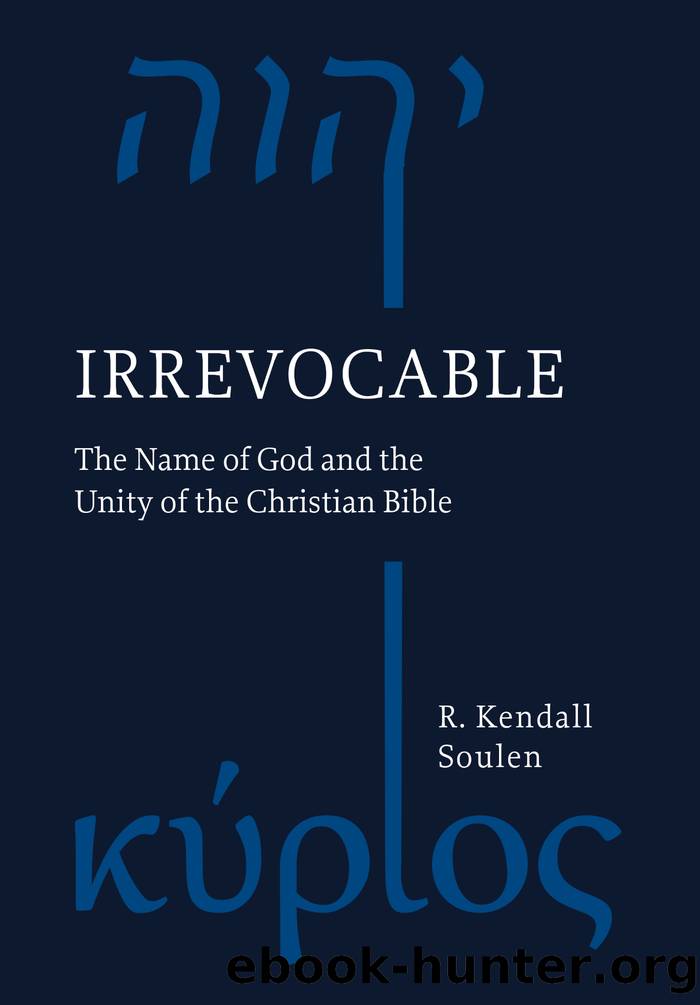Irrevocable: The Name of God and the Unity of the Christian Bible by R. Kendall Soulen;

Author:R. Kendall Soulen; [Soulen, R. Kendall]
Language: eng
Format: epub
Tags: REL067000 RELIGION / Christian Theology / General, REL067110 RELIGION / Christian Theology / Systematic, REL102000 RELIGION / Theology
Publisher: National Book Network
A Hypothetical Scenario Revisited
The practice of name avoidance was not only characteristic of Second Temple Judaism. It has also been characteristic of the two great religious traditions that stem from that period, Judaism and Christianity. But while Jews have avoided the pronunciation of the Tetragrammaton in full cognizance of what they are doing, Christians generally have not. A telling illustration of this appears in the following statement by the German theologian Otto Weber (1902â66): âWhy then, we must ask, do [Christians] not say âYahwehâ? The only possible answer is that the name Yahweh belongs to the old covenant. . . . It does not occur in the New Testament. . . . Just as Christ is the goal and thus the âendâ of the law, the name Yahweh attains its goal and its âendâ in him. . . . The name Yahweh belongs as a name to the unfulfilled law, to the promise, to the old covenant. . . . If the Church still wanted to say âYahwehâ (or perhaps) âJehovah,â then it would be denying what God has done.â17
For all its extravagant wrongheadedness, Weberâs statement contains an unintended grain of truth. Whenever Christians have insisted on pronouncing the Tetragrammaton in the context of the churchâs worship, they have indeed deviated in an important way from the example of the New Testament. Contrary to what Weber supposes, however, the deviation consists not in assigning a sacred significance to the Divine Name that the New Testament does not. Rather, it consists in failing to recognize and honor the Tetragrammaton in the distinctively Jewish register that the New Testament employsânamely, reverent nonpronunciation.
Once Christians become aware of this fact, however, they are faced with the dilemma that we noted at the start of this chapter. Christians have traditionally interpreted distinctively Jewish practices such as circumcision and dietary laws according to the pattern of promise, fulfillment, and cancelation. Name avoidance is one such distinctively Jewish practice. Therefore, it seems that Christians should âcancelâ name avoidance. And yet for nearly two millennia, they have not. It is true that Christians have not been as consistent about this as Jews have been. Since the medieval period, Christians have sometimes used vocalized forms of the Tetragrammaton in both academic and liturgical settings, and they still do so today when singing hymns such as âGuide Me O Thou Great Jehovah.â Yet such cases amount to something like âthe exception that proves the ruleâ when weighed against Christian history as a whole. Overwhelmingly, Christians have avoided pronouncing the Tetragrammaton, especially when reading the Scriptures, celebrating the sacraments, and so on. What then should they do?
One option that wonât work is to invoke Augustineâs theory that the validity of the Mosaic law is divided into tria tempora (three periods of time). The first period is the time before Christ, when the ceremonial laws were valid and preparatory of Christ, while the third period is the one that the contemporary church inhabits, when the gospel is widely proclaimed throughout the world and the continued observance of the Mosaic law is a sin.
Download
This site does not store any files on its server. We only index and link to content provided by other sites. Please contact the content providers to delete copyright contents if any and email us, we'll remove relevant links or contents immediately.
| Hadith | History |
| Law | Mecca |
| Muhammed | Quran |
| Rituals & Practice | Shi'ism |
| Sufism | Sunnism |
| Theology | Women in Islam |
The History of Jihad: From Muhammad to ISIS by Spencer Robert(2210)
Nine Parts of Desire by Geraldine Brooks(2011)
The Turkish Psychedelic Explosion by Daniel Spicer(1990)
The First Muslim The Story of Muhammad by Lesley Hazleton(1886)
The Essential Rumi by Coleman Barks(1634)
The Last Mughal by William Dalrymple(1573)
Trickster Travels: A Sixteenth-Century Muslim Between Worlds by Davis Natalie Zemon(1546)
1453 by Roger Crowley(1488)
by Christianity & Islam(1350)
God by Aslan Reza(1335)
Muhammad: His Life Based on the Earliest Sources by Martin Lings(1291)
A Concise History of Sunnis and Shi'is by John McHugo(1278)
Magic and Divination in Early Islam by Emilie Savage-Smith;(1202)
The Flight of the Intellectuals by Berman Paul(1182)
No God But God by Reza Aslan(1160)
Art of Betrayal by Gordon Corera(1136)
What the Qur'an Meant by Garry Wills(1122)
Getting Jesus Right: How Muslims Get Jesus and Islam Wrong by James A Beverley & Craig A Evans(1081)
The Third Choice: Islam, Dhimmitude and Freedom by Durie Mark & Ye'or Bat & Bat Ye'or(1069)
